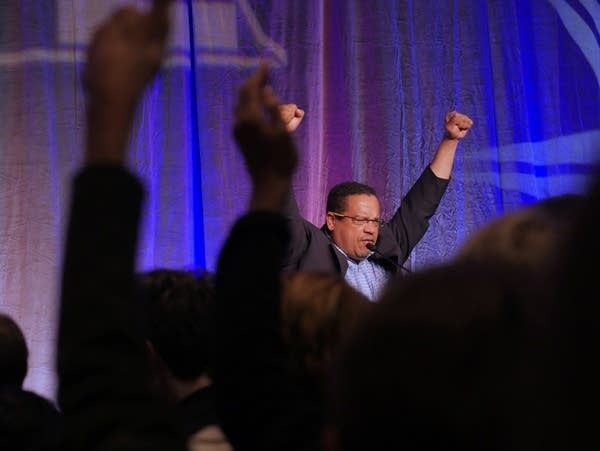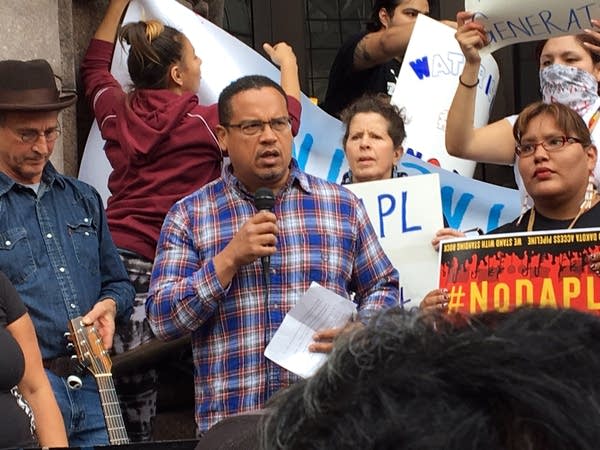With stakes high, Ellison presses his case to lead Democrats

Soon after Keith Ellison declared himself a candidate for the Democratic Party's top post last fall, the Minnesota congressman hopped a plane to California, one of the few remaining power bases for a party becoming increasingly isolated on the map.
There, he held a series of one-on-one meetings with key activists and delivered a rousing speech at a party gathering where attendees were in a funk over a disastrous presidential election.
"Everything he had to say had people jumping and clapping and cheering," recalled Sandra Lowe, one of those who got a taste of Ellison and quickly signed onto his candidacy to be chair of the Democratic National Committee.
It was a recipe Ellison would repeat in state after state: individually courting the voting members who will decide the DNC race this weekend in Atlanta while providing a pep talk to the party's grassroots that will determine how well Democrats begin their electoral recovery.
Create a More Connected Minnesota
MPR News is your trusted resource for the news you need. With your support, MPR News brings accessible, courageous journalism and authentic conversation to everyone - free of paywalls and barriers. Your gift makes a difference.
Ellison, 53, emerged as an early frontrunner, but has since wound up in a hard-fought contest, mainly with Tom Perez, the former Obama administration labor secretary.
In the race, Ellison — Minnesota's first black member of Congress and the nation's first Muslim congressman — has encountered questions about his past political activism and skepticism about his ability to connect with the voters who fled the Democratic Party in recent years.
But neither Ellison, Perez nor other lesser-known candidates are seen as having a lock on the DNC post, giving the party's winter meeting plenty of intrigue.
The decision will be made by 447 voting delegates, including state party chairs, Democratic stalwarts and labor leaders. It takes a simple majority to win. Multiple ballots are expected.

After eight years of President Barack Obama as the clear face and main messenger of the Democratic Party, his departure left a void at the top. The November election that shut Democrats out of power in Washington also touched off ample reassessment of the party's philosophy and strategic direction in the era of President Donald Trump.
The stakes are high, said David Hamrick, a Democratic strategist closely watching the contest but not involved in it.
"Without holding the White House and with being in the minority in both houses of Congress, the DNC chair plays a bigger role than they might play in other situations where you have their party controlling the levers of power," Hamrick said. "And they're going to be a very visible voice for the opposition in this country."
Besides Ellison and Perez, the candidates for the job are: South Carolina Democratic Party Chair Jaime Harrison; Idaho Democratic Party Executive Director Sally Boynton Brown; Mayor Pete Buttigieg of South Bend, Ind.; strategist Jehmu Greene of Texas, a Fox News commentator; Wisconsin attorney Peter Peckarsky; and Ohio Air Force reservist Sam Ronen.
Ellison declined repeated interview requests from MPR News. He's locked down Minnesota's votes, so he's been on the road searching out support in Democratic strongholds like California and New York, and even in reliably Republican states like Wyoming. And he has appeared on shows with big left-of-center audiences.
On Comedy Central's "Daily Show" recently, Ellison cast himself a fighter for the working class and said it's time for his party to show some backbone.
"We can't just hope that we get a fumble from Trump," he said. "We have to have a plan and we've got to be out there swinging."
While Ellison's Democratic Party has struggled up and down the ballot, he has had little trouble in a district centered in Minneapolis. He won it with about 70 percent of the vote last fall. Ellison announced in December that he would resign from the seat if elected DNC chair.
He has held the seat since 2007, after four years in the Minnesota House before that. During the first congressional campaign, Ellison was forced to answer for actions as a college student and young lawyer in which he preached civil disobedience and spoke fondly of Nation of Islam leader Louis Farrakhan, whose teachings were regarded as extreme and separatist.
Ellison sought to distance himself from those days and said he no longer had a positive view of Farrakhan.
The old Ellison writings and connections resurfaced in this latest campaign, drawing charges of anti-Semitism and shakiness toward prominent U.S. ally Israel.

When the controversy failed to die down, political leaders of Jewish faith came to his defense, including U.S. Sens. Bernie Sanders and Chuck Schumer. And Ellison moved to counter the narrative, issuing an open letter to the head of the Anti-Defamation League.
"My record proves my deep and long-lasting support for Israel, and I have always fought anti-Semitism, racism, sexism and homophobia — the same values embodied by the Anti-Defamation League," Ellison wrote in the December letter. "I believe that this is an attempt by right-wing interests to drive a wedge between long-standing allies in the fight for equal rights. We cannot allow that to happen."
The other persistent rap on Ellison's candidacy is his ability to repair the party in rural America and other places where Democrats have struggled. His defenders dismiss the idea Ellison, who represents a largely urban district, would have limited appeal as party chair.
"Some of it is a little racially coded. Keith is a black Muslim so clearly what people are trying to say is he will only appeal somehow to people in the urban core," said Minnesota DFL Party Chair Ken Martin, an ardent backer. "What I've told people is, that's ridiculous."
Martin said prior to Ellison's first run for Congress, his 5th Congressional District suffered from lower turnout than anywhere in Minnesota.
Martin said Ellison fulfilled a goal to drive that up by mobilizing people who either hadn't voted before or had stopped participating. Martin said Ellison also took his organizing around the state to boost statewide DFL candidates; the party has won every statewide race since 2008, some by narrow margins.
"That's the type of work in very tenacious that way you need in a DNC chair," Martin said. "Someone who's not afraid to go into the lion's den, someone who is not afraid to go into red areas and get people sort of get people mobilized and energized and excited about our parties and our values. He's been just as well received in rural parts of the state as in the suburbs and urban core."
Lowe, the California delegate, said Ellison's style is what her party could use right about now.
"Campaigns are not, you know, won by someone managing. They're won by people connecting with voters," she said. "And that makes a big difference."
But Perez is also known for his rapport, especially in one-on-one interactions.
Texas Democratic Party Chair Gilberto Hinojosa knows both Ellison and Perez. He met Ellison through a trusted political adviser to the Minnesota congressman who once worked as Hinojosa's top aide before returning to the Ellison's fold.
But Hinojosa is siding with Perez in this race.
"I will never say anything bad about any Democrat. There was nothing about Keith that pushed be toward Tom," Hinojosa said. "I know Tom and I see his ability to do things."
He describes Perez, a Harvard-educated civil rights lawyer, as someone who chose public service over cashing in and someone who has repeatedly come through for people straying from the party.
"He can speak to these issues directly because he gets them," Hinojosa said. "And he's so damn smart that he can figure out how to articulate our message and fight for these issues for those the blue-collar workers that somehow felt the Democratic Party is not with them anymore."
Nonetheless, Hinojosa said Ellison has a strong following in the Texas delegation, which is one of the biggest. That's part because of Ellison's backing from major labor unions.
Perez carries endorsements from party figures close to Obama including former Vice President Joe Biden, although Obama has so far stopped short of a formal nod.
Ellison's big-name supporters include Massachusetts U.S. Sen. Elizabeth Warren and former presidential candidate Sanders, a Vermont senator.
Political observers have noted the close but not entirely precise overlap between Sanders backers in Ellison's corner and those most strongly behind 2016 nominee Hillary Clinton going for Perez.
Hamrick, the unaligned party strategist, said he hopes the chair's race won't reopen scars from the 2016 primary battle between Clinton and Sanders.
"I do think it's important not to use the DNC chair's as a way to re-litigate the primary of 2016 that led to the Democrats losing the election," Hamrick said.
"I think it's really important that they look forward and figure out the best person who's running to go out and build the infrastructure of the party in all 50 states," he added, "to be the voice of resistance to Donald Trump and to stand up for core progressive values."